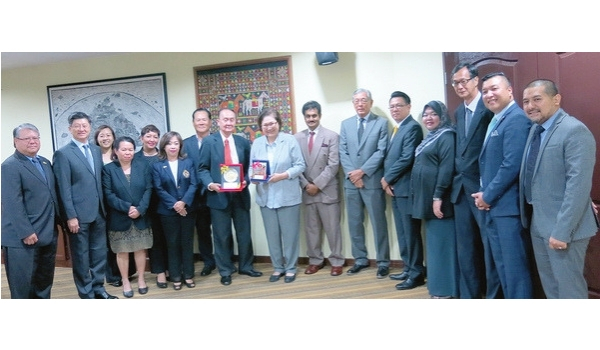Focus on increasing tourism manpower
Published on: Thursday, October 11, 2018

Kota Kinabalu: Deputy Chief Minister cum Minister of Tourism, Culture and Environment, Datuk Christina Liew will bring the issue of shortage of skilled manpower in the burgeoning tourism industry to the attention of the State Government.She gave the assurance during a meeting with officials from the Asian Tourism International (ATI) College and Malaysian International Chamber of Commerce and Industry (MICCI), recently."Based on our estimation and accurately so, tourism is the third biggest revenue-earner for Sabah after palm oil and crude oil. For this reason, the State Government and my Ministry are focusing on it. I am aware of the increasing demand for more trained personnel in the tourism sector, now that we are seeing an influx of tourists from China in particular.
ADVERTISEMENT
"I would raise the College's request for financial aid with the State Government. Apart from the PTPTN loans for students, we will try to seek sponsorship from Yayasan Sabah and big corporations if possible,"she said.Briefing Liew on the financial woes facing ATI College, Executive Chairman Datuk Seri Wong Khen Thau urged the new Government to view it seriously."Lack of human capital development for the tourism industry is a serious issue. It is very alarming for Sabah. We (ATI College) provide crucial manpower for the Tourism, Culinary and F&B Industries.However, the major slash on PTPTN loans from the Federal Government has affected our intake of students. We had appealed to the previous Government but to no avail.
ADVERTISEMENT
"Loans aside, private colleges in Sabah like ours have never enjoyed grants or allocations from the Government unlike the independent Chinese secondary schools and government-run university colleges, community colleges and polytechnic institutions," he pointed out.The Minister concurred with Wong that the focus should also be on developing tourism awareness among the youths, especially those from the rural districts like Kota Marudu, Pitas and Keningau, among others, in the interest of human resource development and career prospects.
ADVERTISEMENT
"Some 60pc to 70pc of our ATI College students are from rural areas.They need help as the government loans are just sufficient to cover the tuition fees. The College has a capacity of 700 to 800, of whom 70pc to 80pc apply for loans. For a two-and-a-half-year diploma course in culinary arts, the cost is about RM20,000 per student. As the PTPTN loan has been slashed down to RM12,000, the College has to subsidise heavily to the tune of about RM8,000. We also provide free transport and accommodation to trainee students," said the President of the Sabah Association of Private Institutions of Higher Learning.Wong, who is also Chairman of MICCI Sabah Branch, presented the following requests to Liew.- Provision of a State government scholarship for the Tourism, Hospitality and Culinary Programme
- Provision of funding for government loans to enable more students to pursue education under the Tourism, Hospitalty and Culinary Progamme
- Assistance for poor rural students to pursue studies at the College
- Creating a "Tourism Lab" for all trainers, lecturers and other players in the industry to work together.
With a five-star rating, ATI College has been in operation for 21 years. Wong said it is the only homegrown skill training institution in Sabah offering tourism-related courses, and also trains potential tourist guides. These include Diploma in Diving & Resort Management, Diploma in Tourism Management, Diploma in Hotel Management, Diploma in Culinary Arts, Diploma in Pastry Arts and Certificate in Culinary Arts.Based on a study, he said approximately 40,000 students graduate at SPM level each year but only 20,000 of them pursue further studies."What will happen to the other 20,000?" he asked. In his briefing, Wong, who is also Chairman of MICCI Sabah Branch, disclosed that there is 95pc employability of graduates within the Tourism, Culinary and F&B Industry. "The remaining 5pc either start their own business in the F&B Industry or venture into other economic sectors," he said.According to him, ATI College graduates are much sought after by hotels at the operational and managerial levels, apart from travel agencies. Wong, however, lamented that trainers in the tourism sector are "unsung heroes" in that not much attention was paid to their grievances in the past. He did not elaborate."I hope the Minister will look into this aspect. Trainers are contributing significantly to manpower development in Malaysia," he added.Meanwhile, the Minister said some of the suggestions made by the delegation are in the pipeline awaiting implementation. "For instance, the Ministry through the Sabah Tourism Board (STB) is in the process of converting Gaya Street into a 'walking street' for tourists only at night. This is an ideal place for them to sample local delicacies and buy Sabah souvenirs. It is opening soon. The spot will be closed to traffic temporarily. We will try it out for three nights a week, and if it works well, then we will have it every night," Liew enthused.She was responding to John Lo, a member of the ATI Board of Governors, who said based on feedback from Chinese tourists, they have no place to spend their money while holidaying in the State capital. She also took note of his call for the revival of the now-defunct Sabah International Hotels Association (Siha), which had been absorbed by the Malaysia Association of Hotels (Mah).She reiterated that the issues of managing dirty toilets, opening of more Immigration counters at the KKIA and making available Chinese-speaking officers to cater to Chinese tourists, were being addressed. "Malaysia Airports Bhd (MAB) has assured me that everything will be in order by the end of the year," she said.The meeting with the Minister also revolved around tourism tax, shortage of tourist guides in Sandakan and Tawau, RSTG (Regional Sabah Tourist Guide) Training Course which offers a JPK Skill Certificate for Tour Guide (JPK is Department of Skill Development) and the Sabah Hospitality Fiesta. According to RSTG Lead Trainer Lim Su Khiong, this programme is only for Sabah where the training curriculum was designed by tourism players. "Rest assured, I will work on what has been raised. And I will look into the suggestion that a 'mystery shopper' programme be put in place. The purpose is for 'mystery shoppers' to check out things on the ground and report directly to me. In fact, I am a 'mystery shopper' myself. Every time I travel, I would check the condition of toilets at the KKIA or those at other airports in major towns," she said.Others in the ATI delegation were Chairman of ATI Board of Governors, Datuk Gabriel William, Assistant CEO (Academic/Administration), Marcus Solibun, Assistant CEO (Corporate & Skill), Romy Al-Hami Azeer, Head of Culinary Arts cum Chairman, Sabah Hospitality Fiesta, Alvin Ting and Head of Tourism, Ruhaidah Mohd Yusof.Meanwhile, President of MICCI, Datuk C.K. Tan said licensing is controlled by Motac (Ministry of Tourism, Arts and Culture) whereby vans owned by resorts and hotels are not allowed to pick up passengers from the airport and bring them from one place to another, prompting.Stay up-to-date by following Daily Express’s Telegram channel.
Daily Express Malaysia










